- About Us
- Columns
- Letters
- Cartoons
- The Udder Limits
- Archives
- Ezy Reading Archive
- 2024 Cud Archives
- 2023 Cud Archives
- 2022 Cud Archives
- 2021 Cud Archives
- 2020 Cud Archives
- 2015-2019
- 2010-2014
- 2004-2009
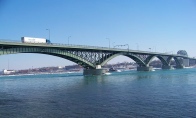 |
February 2010 - The Cud On The Road: |
When you're in the van heading south you think, "That's going to be such a bizarre place to be. You have never been anywhere like that before." Then you remember, you have. As a kid, you were stuck in traffic on the Peace Bridge between New York and Ontario on vacation to Canada's Wonderland. On your knees in the back of your parents' van you exhaled hot air onto the glass, trying to expose where Johnny Rancini had written "Beans make you toot" months earlier at your birthday party. Your van stopped on the bridge exactly between the American and Canadian flags. "Cool," you thought. "If you're ever wanted for a crime, you'll come here and live between those two flags. Then neither side can capture you! You'll set up a tent on the sidewalk and fish off the side of the bridge!" It was a real eureka moment for a ten year old.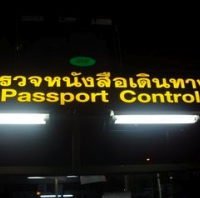
Your motives are different this time, so is the border. You're 26 and you need to renew your tourist visa, which requires you to leave the country.
In cheap, plastic flip-flops you unload from a van at a nondescript intersection on the south side of Sadao, Thailand. The driver—a man with an adamantine physical presence forged by a career driving on Thai roads—stands next to the van and says, "Go border?". You nod and watch eagerly to see where his hand will point when a large truck zooms so suddenly past that you recoil and assume the fetal position in midair, only to bounce off the van and land on your knees right where you started. The driver's hair is still flitting in the truck's breeze when he laughs and gestures vaguely to your left before getting back in the van. It doesn't really help, but you figure all roads lead to the border.
Past a rise in the road you can see the upper half of a hotel with banners of heavily made-up coquettish women hanging from the roof. It's brash and gaudy, perfect for luring unenthusiastic teetotalers from Malaysia. You were told it was the last building before the border.
It's half past four. You know your direction now, and the sun still has life in it, so there's time to eat. A man with a Fu Manchu mustache roasts chicken over the metal drum of a washing machine, and has a single, long palm frond growing out the back pocket of his pants. He wears a pale blue polo shirt. He sees you staring at his barbecue. The chickens are whole or cut roughly into pieces, but still recognizable chicken shapes. It's none of that sterilized American neat-and-tidy bucket of wings stuff. You stare at the succulent breaded meat, fixated on the juices boiling and erupting out of the flesh. The smell of charcoal and meat evokes a primal hunger that you can’t ignore.
"Go border?" he says.
"Eat chicken."
"Alai wa?" He doesn't understand.
"Khao gai." You attempt a translation of your own words. 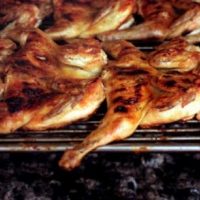
The Fu Manchu chicken man strokes his mustache with one hand. He has a leathery forehead upon which the history of the town is written. With his other hand he shields the sun from his eyes, which then focus with understanding.
"Go border?" he says.
You gesture to the chicken, but hesitate to inquire a price. Sadao is in the Arkansas of Thailand. The way they speak, not even other Thais can understand them. But it's foreign situations just like this that you seek. Whether by language, culture, or location, this friendly tension makes you feel unique. You have to expose yourself to the awkwardness to make it worthwhile. After a conversation that is much longer than needed, the Fu Manchu chicken man smiles and twirls his moustache and you pay twice as much as you should have. But you get your chicken, and you sit on the curb painted red and white like a barber pole and eat it to the bone. You toss the scraps to a hairless black dog. Then you trade the Fu Manchu chicken man a Marlboro for a hand-rolled palm frond smoke and set off toward Malaysia. The time is ten minutes before five.
The Thai border infrastructure is large and new, thanks to tourist dollars. A series of black, corrugated metal booths are lined up along the exit and entrance roads. A matching awning spans the road and melds with the roof of the administrative offices on the exit side of the border. It seems as out of place at the edge of Sadao as the first big box store that comes to the fringe of a traditional American town in the name of progress. A busload of tourists unloads as you approach, so you're at the back of the line. This causes a delay, and you gauge the sun's progress accordingly. The last van back to Songkhla leaves at seven o'clock, shortly after dark. The time is twenty past five.
You're fortunate, when you step up to the official's booth, that he speaks English. You lost your passport weeks earlier in a different country, and now carry an emergency temporary replacement. It's the model of passport your parents would have carried when they were your age, but it looks suspect in the twenty-first century. There's no bar code, and your photo is simply glued to the page. You explain this to the official. He inspects the passport closely, and you get your stamp. 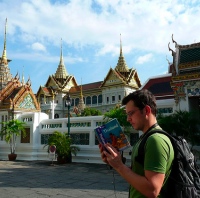
Step one- get stamped out of Thailand.
Step two- get stamped into Malaysia.
Step three- get immediately stamped out of Malaysia, which makes you eligible for,
Step four- get stamped back into Thailand for another month.
As you step away from the booth you chuckle at a group of tourists who walk with their Lonely Planet guidebooks in front of them like divining rods in search of authenticity. You see them turn away in embarrassment from a young taxi driver. The cabbie gestured, “Come here,” but to the Westerners it looked like “Shoo.” You know that much. But you're not interested in a taxi. You're going to walk across the border. The time is ten minutes before six.
This is no Peace Bridge; this is a veritable No Man's Land. There's an armed insurgency afoot. Thai Muslims in the neighboring border provinces of the otherwise Buddhist Thailand want autonomy, and they're fighting for it. The Malaysians are a bit touchy about it. Two countries, technically at peace, stare warily across a swath of cleared jungle spanned by a road and a sidewalk. You flatter yourself that, right now, they're all watching you.
"Why would such a pale man walk across a long stretch of shadeless jungle?" they ask.
A good question, to be sure. It is an investment in fond memories. You want to stand in the narrow gap between the Thai and Malaysian flags and deal out a deck of cards—a crime in Thailand—and find a Muslim woman to marry your pagan soul—a crime in Malaysia. Then just lean back and laugh when both advancing sides halt at their respective banner and admit they've been thwarted by your strategy of standing exactly between the flags. But you just keep walking. What a lonely walk it is. On your right a concrete barrier separates you from the busy road. On your left a chain link fence topped with barbed wire hems you in. Beyond the fence is the No Man's Land, fifty yards of hewn greenery abutting a wall of jungle. Cows roam the void, pro bono mowers. "Are they Thai cows or Malaysian cows?" you ponder. "Whichever they are, they're not American." Along with the sounds of the birds and the types of beer, the varieties of livestock along the side of a road are a sort of identification for any location in the world. You rarely pay attention to them, unless they're different. Cows the color of a Good Humor Toasted Almond Bar, with flabby humps over their shoulders and thick, loose flaps of skin hanging from their chests are foreign, of that you're sure.
You rarely pay attention to them, unless they're different. Cows the color of a Good Humor Toasted Almond Bar, with flabby humps over their shoulders and thick, loose flaps of skin hanging from their chests are foreign, of that you're sure.
It takes precious few minutes for the harsh sun to burn you. You shield your forehead as you arrive in Changloon. The time is six o'clock. Despite the lines at the booths in Thailand, this single, air-conditioned room in Malaysia is empty. A lone border official sits contentedly behind a desk. She shifts her newspaper slightly to keep an eye on you without making eye contact. You approach the head-scarfed woman and say "Halo." Her face is round like a fat man’s, though the rest of her is of healthy proportions. English is widely spoken in Malaysia, so you're again able to explain your unorthodox passport. She stamps it matter-of-factly, raises an arm with a shiny silver watch on the wrist, and points with her thumb to the door.
You cross the street and reverse the procedure. First you go through the x-ray machine and then you approach the passport desk. This man does not speak English, but based on his effortless motions around his workstation he must have years of experience. He seems to grow right out of the stool upon which he is planted. He only turns from the shoulders as he reaches for an indexed book behind him, his hands landing precisely upon it without benefit of eyes for navigation. He has a wrinkled brow and pouted lips, which you decide must be the expression of a long career of people explaining to him Why my case is special, Why this is the way it is, Why that isn't. He has seen this before. He consults the index of nation’s passports, confirms the appearance of the antique one in front of him, and you get stamped out. 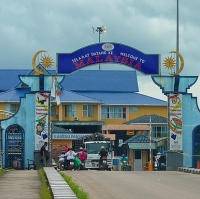 A twenty-minute visit to a country. Thank you, come again.
A twenty-minute visit to a country. Thank you, come again.
The time is half past six. An enormous quantity of heat evaporates off the concrete in waves. You walk your walk while the sun plunges to the horizon. A few frangipanis open on the chain link fence. You enjoy the rich, creamy fragrance from your right that competes with the exhaust fumes from your left. The sun in the tropics disappears fast. It's dusk in mere minutes, so you walk as fast as your cheap plastic flip-flops allow.
Back in Sadao you step up to a booth on the return side and say "Sawas dee krub." You need only to pay your fee and get your stamp to be on your way home. The time is twenty minutes before seven.
"Why," then, "is this official speaking to you in Arkansas Thai at a mile a minute as if you understand?" you wonder. It is because of your archaic passport. Without the electronically readable bar code, this young guard is at a loss. You fidget and tap your fingers on the sill, watching the minute hand pass forty-two, then forty-three, then forty-four. You try to will the mouse to the right place. Eventually the guard rubs his crew cut and awkwardly pokes at his keyboard in the foreign language of English. Thinking, incorrectly, that your country will be under the letter "A" in the drop down box, he fails to distinguish between the equally alien words of "America" and "Armenia." The official decides that was the wrong strategy, as opposed to simply the wrong word, so abandons that plan of action. His is apparently the only open booth. He's on the spot, which he doesn't care for.
The time is eleven minutes before seven. You do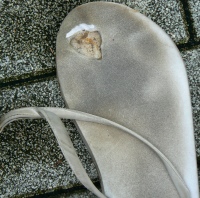 not want to spend the night in Sadao. You only noticed one hotel, and it wasn't meant for sleeping. To the surprise of the official and yourself, you reach through the unspoken barrier into the cool, fluorescent booth. You notice that the guard is left-handed when you see the black, cross-hatched grip of his pistol looming large on his left hip. You bring the dropdown box to the letter "U", execute a few clicks of the mouse, and give yourself a visa. The official shakes his head, stamps your passport, and hands it back to you. You notice his pistol again as you withdraw from the booth without having paid your fee. Step four is accomplished. The time is six minutes before seven.
not want to spend the night in Sadao. You only noticed one hotel, and it wasn't meant for sleeping. To the surprise of the official and yourself, you reach through the unspoken barrier into the cool, fluorescent booth. You notice that the guard is left-handed when you see the black, cross-hatched grip of his pistol looming large on his left hip. You bring the dropdown box to the letter "U", execute a few clicks of the mouse, and give yourself a visa. The official shakes his head, stamps your passport, and hands it back to you. You notice his pistol again as you withdraw from the booth without having paid your fee. Step four is accomplished. The time is six minutes before seven.
Your cheap plastic flip-flops unravel and fall apart as you run barefoot past the lurid hotel, through a pedestrian obstacle course and over the crest of the hill. The city is dark now, you're nervous about navigating back to the nondescript intersection. You know you're on the right track when you pass the Fu Manchu chicken man, who now has a long line of dinner customers. He yells something as you run past; you think you hear the word "Marlboro." You hail the adamantine van driver as you approach the intersection. "Go Songkhla! Go Songkhla!"
"Hello you. Go border?"
"Chai." Yes. "And eat chicken. Now go Songkhla."
He reverts to his perfectly logical gibberish of Arkansas Thai. You take the final seat in the van. The time is seven o'clock.
Brian Spigel is a reformed world traveler based in Portland, Maine, USA. After stints in various American national parks, Antarctica, Thailand, Australia, and the Appalachian Trail, he is currently attempting to live a so-called normal life in Portland.
